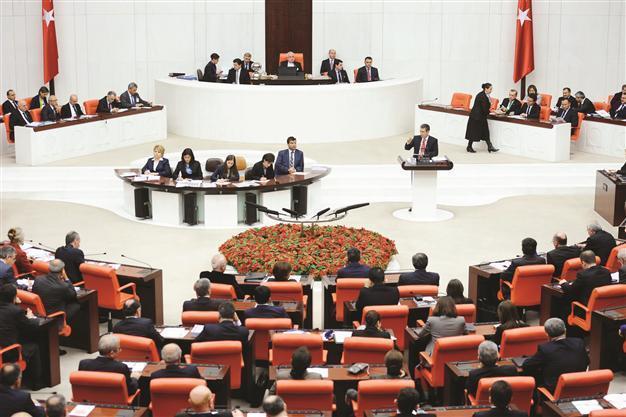Education in Kurdish not written into new Constitution
ANKARA - Hürriyet Daily News

Three parties, the ruling Justice and Development Party, the main opposition Republican People's Party, and the Nationalist Movement Party, allied to keep the same expression on official language in the charter. Daily News photo by Selahattin Sönmez
The right to education in one's mother tongue has been left out of protection in the draft Constitution, a decision justified by its supporters on the grounds that it would be possible to arrange mother tongue education through laws.
At a session of Parliament’s Constitution Conciliation Commission on Aug. 28, three parties - the ruling Justice and Development Party (AKP), the main opposition Republican People’s Party (CHP) and the Nationalist Movement Party (MHP) - allied to keep the current related expression in the Constitution. The expression states that “the language of education is Turkish,” under the article covering the “Rights and Duties of Training and Education.”
The three parties agreed that education in Turkish would not pose an obstacle against granting opportunities for training in other languages. However, the Peace and Democracy Party (BDP), the staunch and sole supporter of inclusion of the term “mother tongue” in the Constitution, argued that it would indeed cause an impediment.
AKP deputy Ahmet İyimaya deemed it “unnecessary” to address the issue within the Constitution. His stance was in line with Prime Minister Recep Tayyip Erdoğan’s recent remarks that education in mother tongues was not on the agenda for the peace process, which is aimed at ending Turkey’s three-decade-old conflict between the security forces and the outlawed Kurdish Workers’ Party (PKK). Education in mother tongue is, nonetheless, a critical demand by the BDP for the progression of the process.
BDP deputy Bengi Yıldız argued that excluding the term “mother tongue” would result in the Kurdish language being eroded over time. While the MHP interpreted it as a violation of sovereignty, the CHP argued that certain lessons could be delivered in Kurdish.
“Training in mother tongue is not enough for a language to survive. An official language such as Turkish which is protected by the state is under threat against English and other languages. Without education in Kurdish, if you are not getting a job in that language, that language tends to be forgotten in time, its training is not enough. One must be able to use one’s mother tongue in a job as well," Yıldız said.
"Education and training in mother tongue must be provided. In Wales, mother tongue is not preferred because it is not used in work life. This will create an obstacle ahead of education in Kurdish. We are talking about children’s rights. A child who speaks in mother tongue goes through a trauma when one starts school [where courses are in a different language]. This situation is also against children’s rights," she added.
However, MHP deputy Faruk Bal argued that education in mother tongue would bring with it demands for Kurdish sovereignty. “The framework of mother tongue means the sharing of other sovereignties. It would create a distinct nation,” Bal said.
In response, Yıldız stated “We are already a distinct nation. This is not a legal, but a natural demand. We do not want the state to give us rights; we want the return of our seized rights.”
Süheyl Batum, a deputy of the CHP, said that certain lessons could be taught in Kurdish. “In locations where certain groups live densely, some lessons could be given in mother tongue, according to demand. For instance, geography [courses] can be in Kurdish. We are not supporting any religion or culture being removed. Everyone can learn, develop their mother tongue. This is a decision about being a nation. First, we must decide if we are one nation, two nations, three nations. If we accept distinct nations, we will regulate their rights after that,” he said.
The AKP, the CHP and the MHP have already agreed during a session held on Aug. 27 to keep Article 3 of the current Constitution in its present form, thus defining the language of the state as Turkish. The AKP has stepped back from its previous proposal of naming an “official language,” instead complying with the term “state’s language.”
